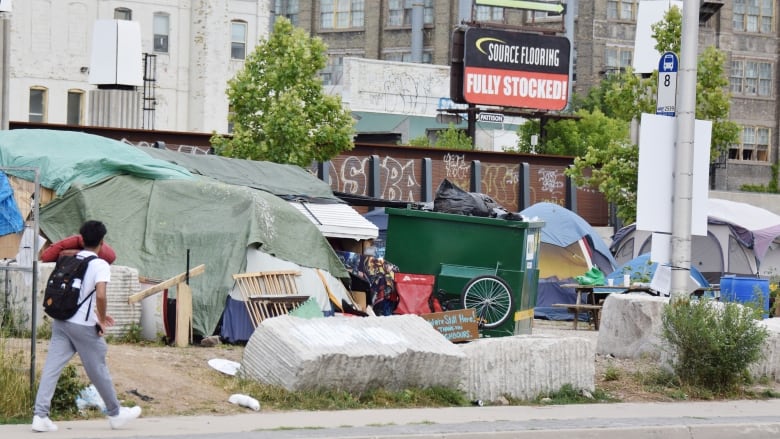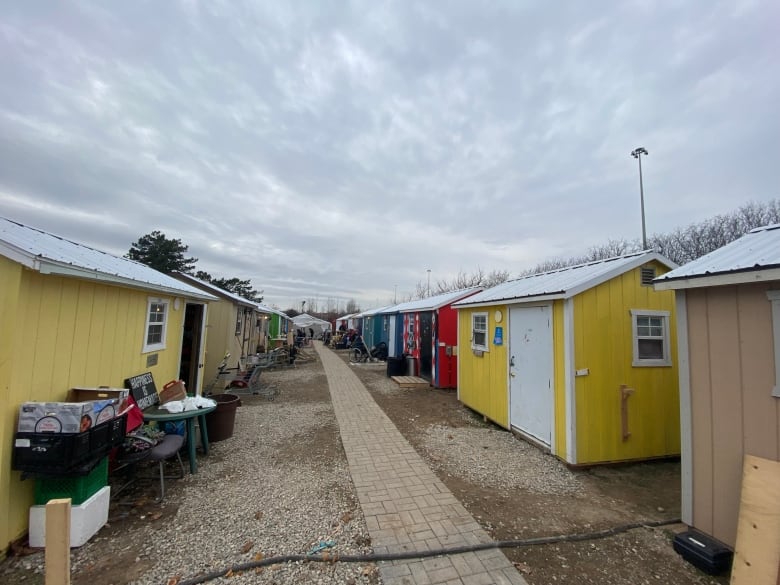Outdoor hybrid shelters get the green light from regional council
Outdoor hybrid shelter model was inspired by a grassroots community initiativecalled A Better Tent City

Regional council members have unanimously agreed to carry forward a motion that will change the way homelessness is addressed in Waterloo Region.
The interim housing plan will support those experiencing homelessness by expanding the region's transitional housing program, home-based support program and emergency shelter program.
The plan also includes permitting people who are experiencing homelessness to live in a managed hybrid shelter.
Council members said the outdoor hybrid shelter model was inspired by a grassroots community initiativecalled A Better Tent City, which is a collection of tiny homes that helped provide a sense of belonging for unhoused people in Waterloo Region.
Regional Coun. Elizabeth Clarke toldThe Morning Edition on Fridaythe outdoor shelter could operate and look similar to A Better Tent City.
"What we have with A Better Tent City that we're seeing is successful and working is some level of oversight, some basic health and safety rules, caps on the numbers and some control of who comes and goes, but the same attention to community building and support forindividuals," she said.
"It's something we think we could build on in more of an emergency shelter capacity."
Ideally, Clarke said she would like to see the outdoor shelter set upbefore the winter, but first staff need tofigure out where it would go and who would operate the site.

Nadine Green, site coordinator for A Better Tent City, told council it would be ideal to limit the size of each shelter to fifty people or less. She also offered suggestions on how to best manage an outdoor shelter.
"[At A Better Tent City], we never tell you there's a time limit. We just let people live as long as they need to... Because if you tell somebody that they have to move, then they get anxiety and they get stressed. So we always give them as much time as they need to heal," she said.
"If they break the rules, then we try to work with them so they try to mend their ways and they can stay."

Estimated costs
The interim housing solutions will cost the region $3,420,000 to operate from Sept. 1, 2022 to the end of this year. After that, regional staff estimate it will cost an additional $10,260,000 to keep the plan up and running throughout 2023. These estimates do not include any capital costs.
Kitchener Mayor Berry Vrbanovic said the region may have to prepare to fund the project on its own at least in the initial stages because of a lack of response from the province.
He said the region has been trying to set up an emergency meeting with the provincial government to help address issues of homelessness and addictions and mental health.
"I'm pretty angry about this," said Coun. Tom Galloway. "The province is not meeting their obligations. These sort of services have to be funded from consumption taxes and income taxes.those are the purview of the provincial and federal government. We keep eating away or increasing property taxes. The burden this is going to create in the upcoming budget discussion cannot be underestimated."
According to a staff report, the costs of the interim shelter plan are also much higher than the projected property tax budget for 2023 that was presented earlier this year, which had also projected a 10 per cent tax increase for regional services (excluding police).
Calls to endevictionatVictoria Street encampment
Delegates at the meeting on Thursday also asked council members to re-consider the move to evict members of the encampment located along Victoria Street in Kitchener.
Brooklin Wallis, a candidate for Kitchener City Council, said it would be hypocritical to promote supportive housing initiatives while also evicting residents of the Victoria Street encampment right before winter.
"Can you imagine how it would look... if council authorised staff to use a hybrid model in August, then evicted a community using this hybrid model just their own version of it, three months later."

Laura Pin, assistant professor of political science at Wilfrid Laurier University, called for the decriminalisation of homelessness in Waterloo Region.
"I am concerned that the court case represents a poor use of scarce funds and energy not only by the region, but also by various community actors who, rather than trying to addressthe needs of our unsheltered neighbours will be forced spend time engaging with the court case," she said, adding that there needs to also be an explicit human rights framework included in the region's plan.
Fidelia Ukueje said she experienced homelessness soon after coming to Canada as a pregnant student attending Conestoga College. She said she had to squat for weeks after having her baby because of a lack of affordable housing options.
During the meeting on Thursday, she asked regional council to push ahead with housing first initiatives that include wraparound services.
"We are asking funds to be allocated for training of staff to use trauma-informed approaches in supporting homeless people rather than approaches that further re-traumatizes them."












_(720p).jpg)


 OFFICIAL HD MUSIC VIDEO.jpg)
.jpg)



























































































